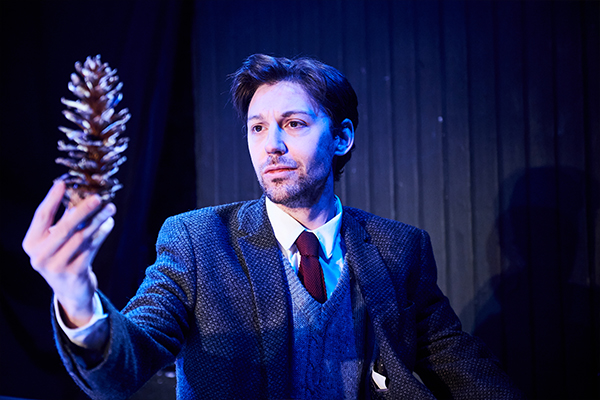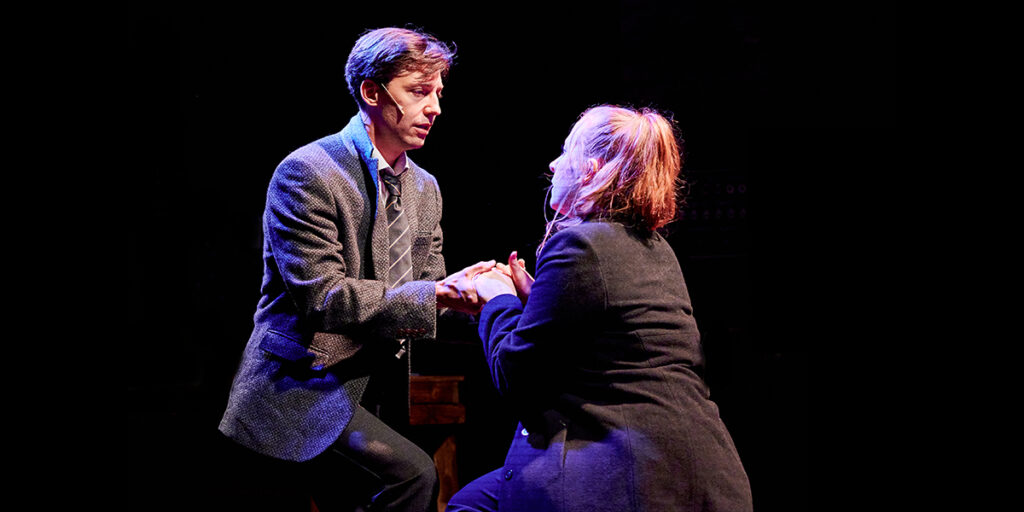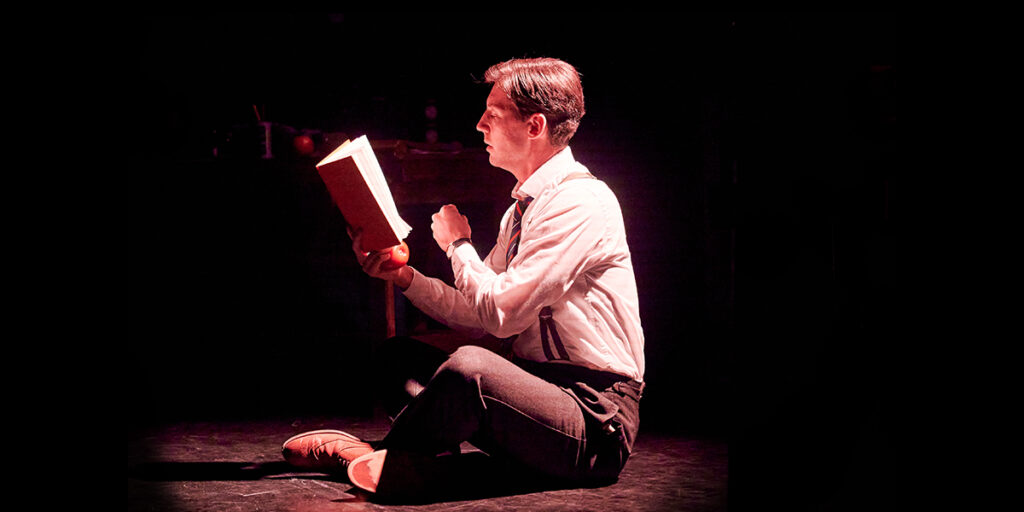AD: Press tickets in exchange for an honest review.
Content warning: discussion of suicide and homophobia.
Writing a show telling the life of a real historical figure is no easy feat, particularly someone with such a complicated and heart-breaking life story as Alan Turing. A man who was initially celebrated for his wonderful brain before being severely and brutally failed by the State, this is a story that must be told with such care and attention to detail to truly give justice to the legacy he has left behind. But did Alan Turing: A Musical Biography manage to crack the code and deliver a show worthy of such a brilliant mind?
For those who don’t know, Alan Turing is one of modern history’s greatest scientists boasting a whole host of titles including mathematician, computer scientist, logician, cryptanalyst, philosopher and theoretical biologist. He is often credited as being one of the fathers of early computer science, formalising the concepts of algorithms and artificial intelligence. Crucially, during the Second World War he worked for the Government Code and Cypher School, located at Bletchley Park just outside Milton Keynes, where he was part of a team responsible for decrypting German ciphers which allowed Allies in the war to defeat Axis powers in several different battles.
Sadly, Turing was never fully recognised for his numerous achievements during his lifetime. Whilst this was in part due to the Official Secrets Act preventing the sharing of government work to the public, most notably Turing was prosecuted in 1952 for engaging in homosexual acts which – at the time – were illegal. To avoid prison, Turing opted for DES, a cruel form of hormone led chemical conversion therapy and the suffering this caused him is thought to have led to his suicide in 1954. It is only in very recent history where we have started to see a true appreciation for his legacy, in both the scientific community and the LGTBQ+ community, which has inspired such works as The Imitation Game and Alan Turing: A Musical Biography.

One of the show’s strengths lies within its musical contributions, composed and produced by duo Joel Goodman and Jan Osborne. There are several really promising musical moments and use of sound to convey the emotion of the piece, which with some fine tunings have the potential to turn into something rather poignant. The strongest moments do come in the form of the duets, performed by Joe Bishop and Zara Cooke, leaning into a very mechanical steampunk sound which compliments the scientific themes of the show but at a stark contrast to the melodic piano accompaniment for individual solos.
What lets the music side of this show down is that there feels to be little distinction between the rest of the songs, with character solos blurring into one another. While I understand the musical direction focusing on the slower numbers, it did unfortunately impact the pacing of the narrative and made the show feel longer than its 80-minute run time. This isn’t to say that the songs are a lost cause, it almost felt like they hadn’t quite found their footing or place within the wider narrative just yet. A key improvement would be to make those slower ballads as engaging as the up-tempo numbers, keeping the audience hooked throughout.
What did grab my attention throughout the show was the lighting design and the significant choice of colour against a minimal set to convey emotion and meaning. While I’m unsure if this is a limitation of the space or the current stop on this show’s long production journey, a minimal set design accompanied by colour washed spotlights was the perfect way to approach a delicate and intimate investigation into the life of someone like Turing. Punchy and impactful, the sharp switches between full stage lighting to single spotlights really helped to draw attention back to the narrative between scenes. While I do think that scarcity was one of the downfalls of the show overall, which I will come onto later, I think that the conscious decision to let the words of the performers lead the audience through the narrative was a very clever creative decision.
Ultimately, I believe that the show has not quite figured out what it is trying to be – and this is where the production falls short. Largely, I think this is linked to a question of who this show has been written for and what it is wanting its target audience to take away from the production. In its current form we receive a largely sanitised version of Turing’s life, spending much longer on his journey to becoming part of the team who cracked the infamous Enigma Code than discussing how he managed to do this and his life afterwards. For a show that centres a gay man, we do not once see him interact with another man on stage and instead find the narrative purely driven by the women who shaped him.

To say that the show discusses the life of a historical figure it seemed puzzling to not dwell as long on the thing that he was most known for, and instead focusing on his companionship with Joan Clarke and how their engagement played out as well as his relationship with his mother. In fact, we see the whole cracking of the Enigma Code brushed over with a selection of lines highlighting the ‘Official Secrets Act’ of 1911 that determined that anything that happened at Bletchley Park must remain under wraps. While this makes sense in the context of the narrative for what the characters are experiencing at the time, and reflects Turing not receiving the flowers he deserved while he was alive, unfortunately this aim isn’t clear and feels almost jarring compared to other pieces of media created about Turing. It does feel like there is an expectation for the audience to go in with pre-existing knowledge of Turing’s life to fill in the gaps.
Additionally, while it is refreshing to see shows where the trauma of a member of the LGBTQ+ community isn’t the central focus of their life, when it comes to Alan Turing it is unfortunately something that is unavoidable. By removing this focus it takes away some of the shock value and extent to how much he suffered at the hands of the state when he is arrested and prosecuted. This was largely done through misplaced jokes and actions to demonstrate that he was actually ‘just a weird little guy’, which felt like an attempt to humanise him but instead infantilised him. The focus of the narrative is instead more on Alan’s impact on the women in his life, rather than their impact on his; even his suicide is overshadowed by a monologue and song performed by his mother. What could have been a very poignant moment of Alan stripping himself of his clothes – symbolically stripping away his desire to continue living a half-life – is overshadowed by his mother’s heartbreak and how loving and accepting she was of his lifestyle.
However, all the above considered is where my question of audience comes back into play. While the level of detail and investigation of themes may be too sanitised for adult audiences, I do believe that this show does have potential to work in a school environment as a touring, educational theatre production. Discussion of gay trauma and chemical castration is of course a heavy topic for, say, GCSE history students, but the level of detail that we get from Alan Turing: A Musical Biography in its current form, in my opinion, would be accessible enough for a younger audience. We understand from the show that Turing was an incredible mind; that he provided the basis for modern computer technology as we know it; that he helped us to win World War Two; and that he unfortunately took his own life due to his punishment by the state during a time where being gay was very much illegal. It is almost a first introduction to Alan Turing as a historical figure, and this is why I think that with some fine tuning it could become a valuable educational tool if the audience focus shifted from adults to young history students.

This production has a fascinating and quite lengthy history, with the production staged at Riverside Studios on 10 January being the fourth iteration to receive a public staging. Based on the production history, moving from a verbatim piece based on Alan Turing’s real letters to a full production with a set script and the introduction of new songs. I respect the transparency in which the creative team have outlined the journey this production has taken, and appreciate that creating new work is tricky. Yet it is this same transparency that has me longing to see earlier versions of the piece to truly understand how, after so many changes, it still appears disjointed and unclear of its direction.
All this being said, I don’t believe that this show is a lost cause but instead could perhaps benefit from taking a step back to refocus the direction it would like to go in. I do think there’s an educational benefit, for those who are not as familiar with Turing and his life, but sadly this show misses the mark as a potentially poignant piece of theatre about one of the greatest minds in history.
Alan Turing: A Musical Biography runs at Riverside Studios in Hammersmith until 27 January 2024. For more information on the run, and to buy tickets, visit: riversidestudios.co.uk


